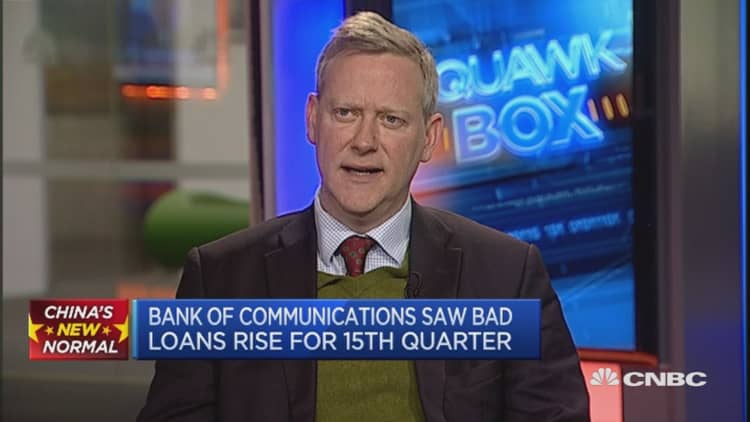



Private investors should steer clear of China's mammoth banks, whose precarious state pose a risk to the world economy, an asset manager specializing in Asia told CNBC on Wednesday.
"Personally, I think the banks are un-investable — as a minority private investor you are likely to be wiped out, maybe many times over," Tiburon Partners' Stewart Paterson said.
"These are organs of the state; they are there to fulfill the agenda of the Communist Party of China and why anybody would want to be a minority shareholder in them I'm not sure."
Paterson joined Tiburon in 2013 to manage its Tiburon Taurus Fund, a long-short Asia-Pacific ex-Japan fund.
On Wednesday, he estimated that China's banking sector was 3.5 times the size of its overall economy. Its "Big Four" commercial banks are state-controlled and are the world's largest, according to Forbes, based on a composite of revenue, profits, assets and market value.
China's Big Four banks — market value:
- Industrial and Commercial Bank of China (ICBC) — $278B
- China Construction Bank — $213B
- Bank of China — $199B
- Agricultural Bank of China — $190B
"Clearly it is impossible for a banking sector that is that big to be highly profitable, because they would be taking too big a slice of the cake. So what we are seeing is falling returns on assets in the Chinese banking sector, which is a reflection of the falling profitability on the industrial side," Paterson told CNBC.
During the global financial crisis, China's banks were used as vehicles by the government through which to inject stimulus into the broader economy. As a result, debt levels rose sharply among local governments and state-owned companies. Consequently banks now hold high volumes of non-performing loans — a problem that is worsening as industrial profitability falls and debtors struggle to service interest payments.
"There is going to have to be a large amount of debt forgiveness and there is going to have to be a large amount of recapitalization of the banking sector in China. How that takes place over the next couple of years we are yet to see any clear guidance on," Patterson said.
He told CNBC that he believed China's banks were the "external risks" to the U.S. economy U.S. Federal Reserve Chair Janet Yellen regularly mentions her speeches and that this helped explain her dovishness regarding further interest rate hikes.
"The Chinese financial system is in a very fragile and precarious situation. It is gargantuan relative to the Chinese economy and of course the Chinese economy has accounted for a disproportionately large amount of the growth that we have seen in the global economy since the global financial crisis," Patterson told CNBC.
"So if this unravels, the deflationary shock that is going to come to the rest of the world is going to be huge and obviously Janet Yellen is well aware of the fact that this is probable, not just possible."
On Tuesday, Citi cuts its forecast for the number of interest rate hikes by the U.S. Federal Reserve in 2016. It now expects the Fed to raise its benchmark rate only once this year, possibly in September or even as late as December.
Two mid-sized Chinese lenders made unimpressive debuts on the Hong Kong Stock Exchange on Wednesday, in part reflecting concerns about NPLs. Shares of China Zheshang Bank — the world's biggest listing this year at around $1.7 billion — and Bank of Tianjin shares finished the day roughly flat.
China's Bank of Communications, its fifth largest lender, was the first among the country's major banks to report earnings this week. The bank warned it would struggle to maintain 1 percent profit growth this year and that the rising tide of NPLs would continue, according to media reports.

